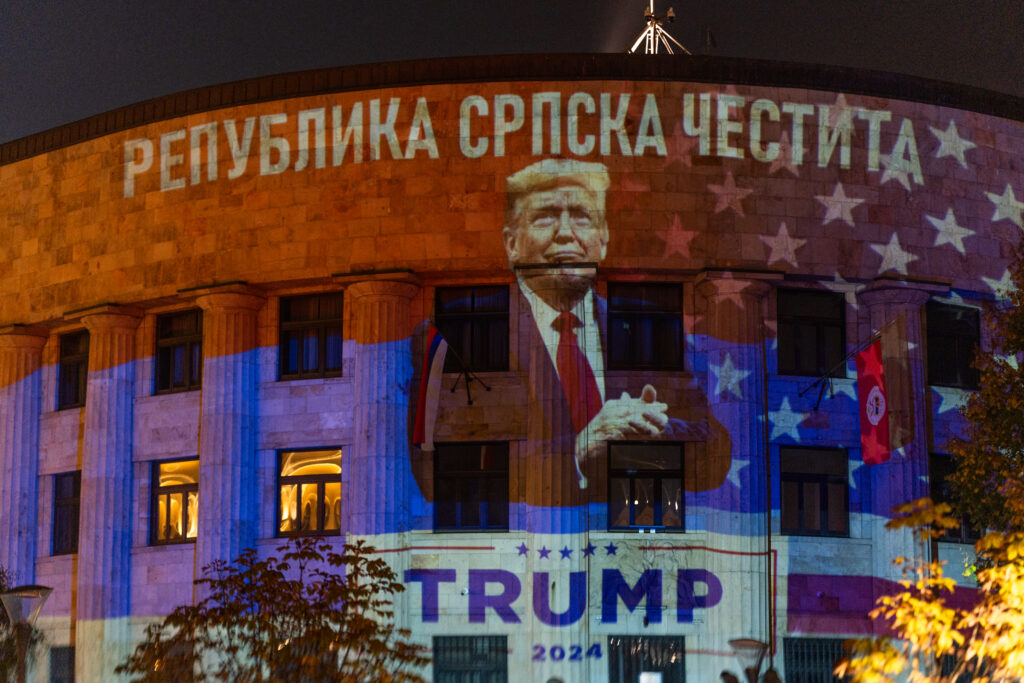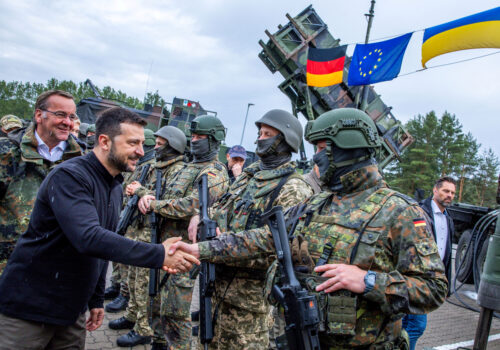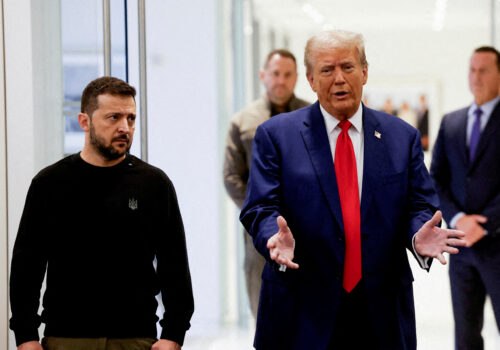
Under President Donald Trump, the United States has rapidly shifted its approach toward Russia and the war in Ukraine. This has many pockets of Europe scrambling to understand the local implications of this change and to adjust their postures accordingly. The Western Balkans—a part of the continent outside the European Union (EU) where the United States has a significant security and development footprint—is already feeling the effects and is bracing for more.
The Trump administration is not expected to focus intently on the Western Balkans anytime soon. Yet it is reasonable to expect that a divergence between the United States and the EU on broader questions of security and trade will be reflected in the region. This could make the Western Balkans into an area of competition rather than complementarity for Washington and Brussels.
Western policy fragmentation could reshape regional dynamics that until recently had been anchored around EU and NATO accession—twin goals that the United States and the EU have pushed for together. Regional leaders who are angry with Brussels, whatever their reasons, may use the “Trump card” to agitate the EU, which could fuel instability and potentially even arms races and conflict.
For now, questions over the future of NATO, unsubstantiated reports that the US military will retreat from the Balkans, and speculation on how a settlement to end the war in Ukraine could change Europe’s borders are already fueling security dilemmas in the region. This is particularly the case in non-NATO countries, such as Kosovo and Bosnia and Herzegovina, which have interethnic tensions, border disputes with neighbors, and a reliance on NATO and the United States as guarantors of peace settlements.
Can Europe fill the gaps created by US disengagement and play a credible deterrent role in the Balkans at a time when it may also have to significantly step up its support for Ukraine? What would happen if, as part of its broader rapprochement with Russia, the United States went over Europe’s head and tried to resolve the Kosovo-Serbia dispute, which Brussels—much to the dismay of Washington—has failed to do for fourteen years? These are questions European policymakers need to start asking themselves.
But the uncertainty the United States’ policy shifts have caused in Europe could also turn out to be a blessing in disguise. The United States’ disengagement from the region could put further productive pressure on Europe to take care of its own security, fill the gaps in democracy promotion that Washington is leaving behind, and jolt EU enlargement from its current limping state.
Backlash against Brussels
US-EU discord is already deepening regional fragmentation, mostly in an anti-EU direction. Early signs of this were visible in last week’s United Nations General Assembly vote on Ukraine, which pit the EU against Russia and the United States.
While Serbia, the region’s hedging power, did vote in favor of the EU-sponsored resolution backing Ukraine, Serbian President Aleksandar Vučić later backtracked and suggested that it was a mistake. North Macedonia—a country whose membership in the EU has been blocked by its neighbors—notably abstained. With Hungary the only EU country to abstain, the contours of a regional Kremlin-friendly Budapest-Belgrade-Skopje axis—hostile toward Brussels and able to paralyze decision making in the EU—are forming.
Countries along this axis understand the transactional nature of the Trump administration and are actively courting strategic US investments for further leverage. In other cases, like in Bosnia and Herzegovina—where Bosnian Serb leader Milorad Dodik is ramping up his secessionist agenda—troublemakers are feeling emboldened to test the limits of the new geopolitical environment.
On the other side of the spectrum is the region’s most pro-US country, Kosovo, which finds itself in a strategic pickle, as its statehood and security rely on transatlantic unity. What’s more, the country’s decision making has been paralyzed in the aftermath of an inconclusive election in February, which could drag out the formation of a new government for weeks, if not months.
Kosovo is highly dependent on the United States for its security and has many grievances with the EU. Its statehood is still not recognized by five EU member states, which blocks any advancement to candidate status, and Pristina remains under EU restrictive measures due to how the outgoing government handled affairs in its Serb-majority north. At least one major part of Kosovo’s political spectrum is also angry at the EU for its treatment of Kosovo’s former leaders who are on trial for war crimes at The Hague—a grievance that some members of the Trump administration apparently share.
Whether Kosovo uses its “Trump card” in the context of a US-EU split depends largely on who forms the next government and what the Trump administration has to offer. For instance, a breakthrough in international recognition would be a compelling prospect. Yet, Kosovo also remains somewhat anxious about Trump’s cordial relations with Belgrade, while acting Prime Minister Albin Kurti, whose party came in first in the recent elections, had an infamously difficult history with the first Trump administration.
Albania and Montenegro seem to be more aligned with Brussels at the moment, as they have positioned themselves as regional frontrunners in the EU accession path and have both set the ambitious goal of joining the bloc in the next few years. Yet, this EU path is affected by another major shift in Washington’s foreign policy. EU accession is heavily centered on rule of law and democratic reforms, areas in which the United States has invested in the past few decades. The Trump administration’s decision to halt foreign aid through the US Agency for International Development (USAID) has given such efforts a major hit. For example, in the past few years, Albania has made progress on tackling elite impunity through new rule of law bodies, which were built largely through US technical expertise and are now vulnerable.
The disruption in the operations of the National Endowment for Democracy (NED)—a key pillar of US democracy promotion—is also shrinking the space for regional civil society. The Serbian government is now persecuting some of the leading pro-democracy nongovernmental organizations under the convenient pretext of “abusing USAID funds.”
How Europe can fill the gap in the Western Balkans
To prevent the further deterioration of the security situation and an authoritarian descent throughout the Western Balkans, Europe needs to step up and claim its role as an anchor of regional security and democracy. On security, that would require not just the usual French-German leadership within the EU, but also an active role for European NATO powers such as the United Kingdom and Turkey, both of which are invested in preserving the regional order and have troops on the ground in the Western Balkans. The upcoming visit to the region by NATO Secretary General Mark Rutte is a welcome sign and should be followed by firm guarantees of deterrence.
On democracy, the EU already has the instruments in place to fund institutional reforms or support civil society—such as the continent’s NED equivalent, the European Endowment for Democracy. Now, it needs to use those instruments to fill the financial gaps left by the United States.
However, the real litmus test of Europe’s power will be its ability to resolve the lingering bilateral disputes in the Western Balkans and to finally push the region forward toward EU accession. Yet, these goals would be best served by an approach that tries to work together with Washington, rather than against it.
Competition over Western Balkans policy between the EU and the United States over the next four years would deepen the region’s fragmentation, undermining any attempts for an agreement between Kosovo and Serbia. Europe also needs Washington engaged because there is a need to deter Russia from continuing to play a spoiler role in the Western Balkans through its regional allies, primarily Serbia. The current US-Russia dialogue seems broad in scope—Washington and Moscow recently discussed Middle East issues—and, with US-EU coordination, these talks could be used to serve joint Western interests in the Balkans.
At the same time, there are actions the EU could take on its own that could incentivize regional actors to anchor around its goals. It could start, for example, by eliminating decision-making obstacles to its enlargement process that have allowed individual member states to stall and veto candidate countries’ membership bids over petty disputes. Much like in the case of Ukraine, Washington cannot be blamed for, nor expected to solve, problems of the EU’s own making.
Agon Maliqi is a nonresident senior fellow with the Atlantic Council’s Europe Center. He is a political and foreign policy analyst from Pristina, Kosovo.
Note: Some Atlantic Council work funded by the US government has been halted as a result of the Trump administration’s Stop Work Orders issued under the executive order “Reevaluating and Realigning US Foreign Aid.”
***
The Western Balkans stands at the nexus of many of Europe’s critical challenges. Some, if not all, of the countries of the region may soon join the European Union and shape the bloc’s ability to become a more effective geopolitical player. At the same time, longstanding disputes in the region, coupled with institutional weaknesses, will continue to pose problems and present a security vulnerability for NATO that could be exploited by Russia or China. The region is also a transit route for westward migration, a source of critical raw materials, and an important node in energy and trade routes. The BalkansForward column will explore the key strategic dynamics in the region and how they intersect with broader European and transatlantic goals.
Further reading
Tue, Feb 4, 2025
Fearmongering from Western Balkan leaders is no longer working on their citizens—or the EU
New Atlanticist By
The European Union has ample leverage to press its concerns on reforms, Russia policy, and regional stability to Western Balkan countries.
Wed, Mar 5, 2025
How Europe wants to rearm itself
New Atlanticist By
Ahead of an important European Union (EU) meeting on March 6, plans are in development at both the EU and member state levels to boost defense spending.
Wed, Feb 12, 2025
What to make of the unfolding Trump strategy on Ukraine
New Atlanticist By Daniel Fried
Trump's call with Putin and his secretary of defense's comments with NATO counterparts stirred controversy. But the unfolding strategy could be the basis for a decent outcome for Ukraine.
Image: The Palace of the Republic is illuminated in the colors of the American flag and with photo of Donald Trump on the occasion of Donald Trump's victory in the presidential elections in the USA, in Banja Luka, Bosnia and Herzegovina, on November 06, 2024. Photo: Dejan Rakita/PIXSELL/Sipa USA.



